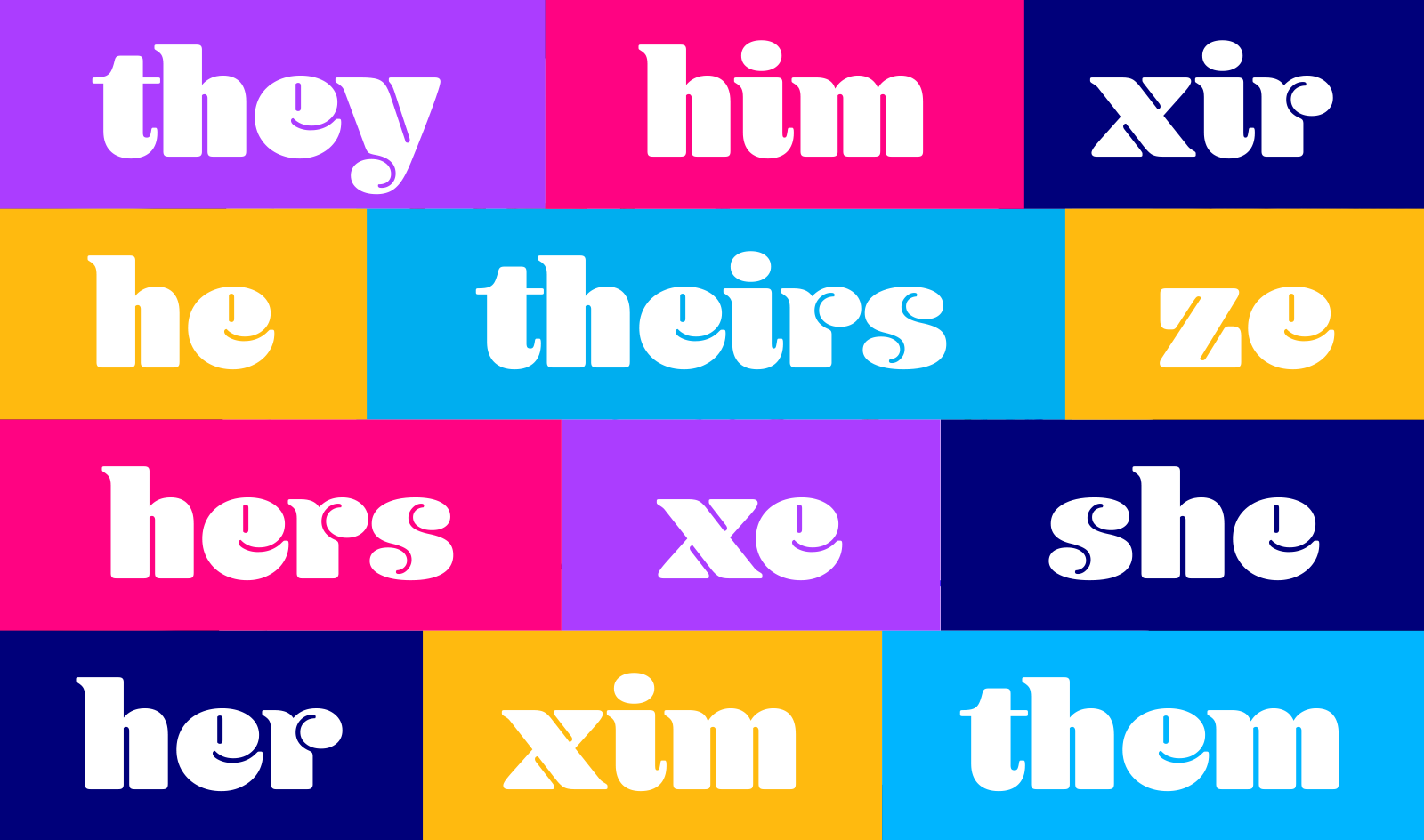The Definitive Guide to Pronouns

#1. Pronouns 101
What are pronouns?
A pronoun is a word that refers to someone who is talking (like "me" or "you") or a person being talked about in the third person (like "she" or "him.") They're a way to talk about someone without using their name.
Third-person pronouns are gendered in many languages, which is why it's important to be intentional, inclusive, and accurate when using them. Commonly used pronouns are "she/her," "he/him," and "they/them."
Why do they matter?
Using the right pronouns for someone, even when they are not around to hear you, is a meaningful sign of respect. It's not just polite; it's the right thing to do. Regardless of whether a person is using new pronouns for the first time, or if they've been using them for a long time, it's equally important to make sure we use the right words when talking about them.
When trans and non-binary people experience misgendering—having someone else use the wrong name or pronouns—it can be awkward, painful, or even unsafe.
A 2018 study of trans and non-binary youth found that using the correct name and pronouns greatly reduces the risk for depression and suicide. For most trans people, it's also important that you use the right language even when referring to them in the past. For example, "When Jordan was a baby, they loved their stuffed teddy bear."
At the end of the day, it's simple: using affirming language is about letting someone know you accept who they are.
What's the significance of sharing what my pronouns are with others?
When you proactively share what your own pronouns are with others, you send a signal that you are an aspiring ally and help reduce the stigma or awkwardness many people feel when talking about gender pronouns. You also help make it easier for trans and non-binary people in your life to more comfortably share their own pronouns and reduce the risk of being misgendered.
How do I find out someone's pronouns?
Just ask! It's always okay to say something like, "What pronouns do you use?" or "What pronouns would you like me to use when I refer to you?" Always use someone's pronouns unless they ask you not to in certain situations (like if they are not yet out at school or to friends/family, or if they are concerned about their safety in public.)
How is "they" a singular pronoun?
In English, "they" is used as a plural pronoun, but it's also a valid and grammatically correct singular third-person pronoun. It's used by many trans and non-binary people as a gender-neutral pronoun.
If you're someone who thinks it sounds a little strange or off, consider this: you've likely been using a singular "they" in your day-to-day conversations already when you don't know or want to assume someone else's gender. For example: "Uh oh! Someone left their wallet here by accident. Let's try to return it to them."
What does it mean if someone uses more than one set of pronouns, like "she/they"?
If someone shares with you that their pronouns are "she/they," it means either pronoun is fine.
- For some people, it means you can alternate between those when you talk about them. For example, "She is such a kind friend. They helped me study for my biology test all last week."
- For other people, it means they might prefer certain pronouns in certain settings, depending on their comfort level or safety. For example, someone might go by "he/him" when among trusted friends, and go by "she/her" when at work.
If you're ever unsure, just ask the person.
What are neopronouns?
Neopronouns are a type of pronouns other than the most common ones we know in a particular language. So, in English, neopronouns include sets like "xe/xir" and "ze/zir." About 4% of queer youth and 2% of queer adults use neopronouns.
Despite having "neo" in its name, neopronouns aren't really that new: their use has been documented since the 12th century. They're also used basically the same as you would any other pronoun. For example: "Dylan ate zir food quickly because ze was so hungry."
For even more information and usage examples, check out the neopronoun guide from the Human Rights Campaign.
#2. Mistakes & misgendering
What should I say if I use the wrong pronouns for someone?
It's perfectly normal to not always know the right words to use, or to simply make a mistake and say the wrong word. Just apologize, correct yourself, and move right along. There's no need to spend a lot of time on it, which might make the other person uncomfortable; they will know you care through a quick apology.
What should I say if someone uses the wrong pronouns for me?
How you respond to misgendering likely depends on the scenario: who are you talking with, and are you safe?
- If it's someone who knows you're trans and is supportive, you might interject and say something like, "She, please." Or, wait until they are done speaking and say, "Just a reminder: my pronouns are she/her."
- If it's someone who doesn't know you well or know that you're trans, you can politely but directly correct them. You may want to say something like, "Actually, my name is Taylor. Please use they/them when you refer to me."
- If it's someone that is intentionally misgendering you, react to them as you would any other bully. Consider your safety, your mental well-being, and whether or not you want to engage. You might choose to confront them, or you might choose to avoid them and leave the situation altogether.
#3. Visibility & support
What if I'm unsure what pronouns are right for me?
It's okay to experiment and to change your mind: you can ask trusted friends or family to try new pronouns when referring to you and see how it makes you feel. You might have very strong feelings, or might not care too much which pronouns folks use for you. Any way you feel is valid.
What are some ways I can make my language more inclusive?
- Don't assume you know someone's pronouns based on their gender presentation. Get comfortable with asking people you meet what their pronouns are until it becomes a quick habit.
- Practice, practice, practice. If you're having trouble using someone's pronouns, you can talk about the person to your pets, your plants, or mutual friends.
- Update your email signature and social media profiles to include your own pronouns.
- When you meet new people, offer your pronouns when introducing yourself. This can be as simple as saying, "Hi there! I'm Addison and I use she/her."
- If you overhear someone using the wrong pronouns for someone else, gently step in and correct them. (This is especially important for cis allies to help protect trans loved ones by taking the burden off of them to stand up for themselves all the time.)
The information on this page is for general education only. It is not medical advice, legal advice, or professional advice. For questions or help with your specific situation, please talk to a licensed doctor, lawyer, or another qualified expert.

Written by Point of Pride
Point of Pride provides financial aid and direct support to trans folks in need of health and wellness care.


